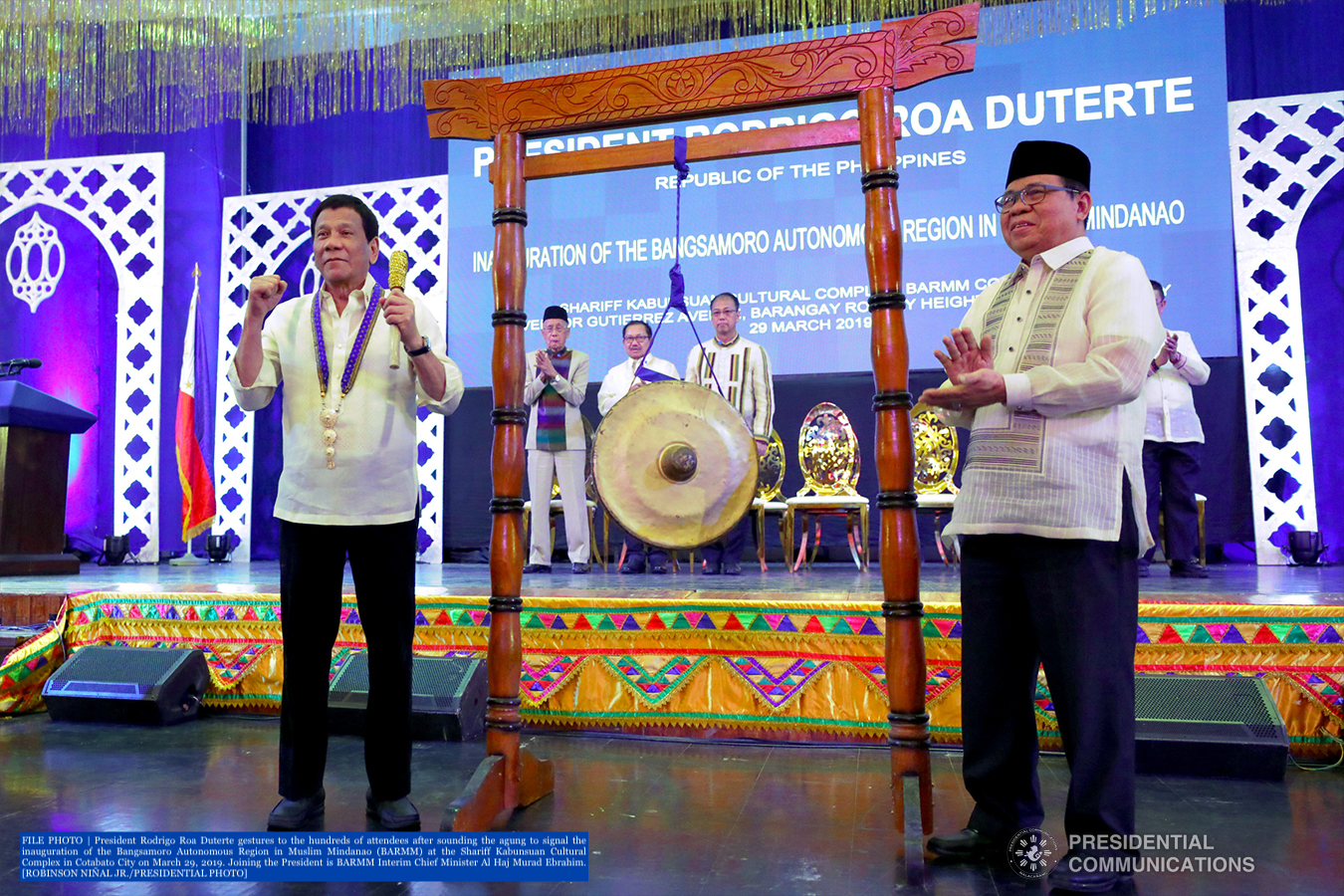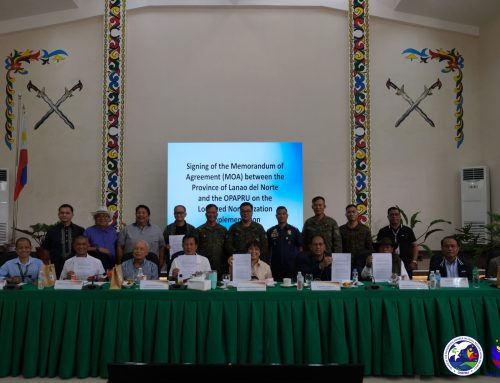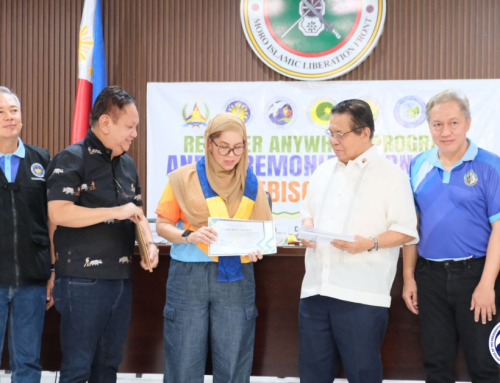BANGSAMORO AUTONOMOUS REGION IN MUSLIM MINDANAO (21 January 2021) — On January 21, 2019, a historic plebiscite marked a major milestone under the political track of the Comprehensive Agreement on the Bangsamoro (CAB), the landmark peace agreement signed between the Government of the Philippines (GPH) and the Moro Islamic Liberation Front (MILF) in 2014.
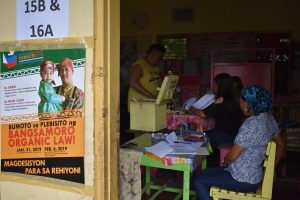
FILE PHOTO | Casting of votes for the BOL plebiscite in 2019
The ratification of the Bangsamoro Organic Law (BOL) through the plebiscite held in 2019 paved the way for the creation of the Bangsamoro Autonomous Region in Muslim Mindanao (BARMM), and the establishment of the Bangsamoro Transition Authority (BTA). RA 11054 or the BOL was signed by President Rodrigo Duterte in 2018.
The BARMM is not only a realization of the Bangsamoro people’s hopes and aspirations; but is also seen as a testament of the sincerity of the Duterte Administration to fulfill the commitments made by the national government under all signed peace agreements with the Moro fronts. The creation of the BARMM and its basic structure of government which materialized through the ratification of the BOL, aim to recognize the aspirations of the Bangsamoro people for meaningful autonomy.
And since its creation three years ago, the BARMM and national government, through the Office of the Presidential Adviser for Peace, Reconciliation and Unity (OPAPRU) and other line agencies, have been closely working together to push forward, sustain and build on the gains of the Bangsamoro peace process.
Intergovernmental cooperation for a smooth transition
The transition period for the BARMM government has had its share of challenges which are being resolved through an intergovernmental effort.
The BOL provides for the creation of the National Government – Bangsamoro Government Intergovernmental Relations Body (IGRB) and other IGR mechanisms to coordinate and resolve pressing issues through regular consultation and continuing negotiation in a non-adversarial manner.
The principle of intergovernmental relations which was stipulated in the Annex on Power Sharing of the CAB, was conceptualized to govern the asymmetrical relationship between the National and Bangsamoro Governments.
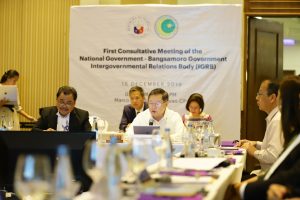
FILE PHOTO | IGRB’s first consultative meeting in 2019
To date, the IGRB through the able leadership of its co-chairs Finance Secretary Carlos G. Dominguez for the GPH side, and Education Minister Mohagher M. Iqbal for the Bangsamoro Government side, has held ten meetings since the body’s official launch on December 16, 2019 in Davao City.
To help ensure the smooth transition of the BTA, the OPAPRU serves as a member of the IGRB’s Joint Secretariat, along with representatives of various agencies of the BARMM Government.
Other IGRB mechanisms include the Philippine Congress – Bangsamoro Parliament Forum (PCBPF), Intergovernmental Fiscal Policy Board (IFPB), Joint Body for the Zones of Joint Cooperation (JBZJC), Intergovernmental Infrastructure Development Board (IIDB); Intergovernmental Energy Board (IEB), Bangsamoro Sustainable Development Board (BSDB), and Council of Leaders.
The IGRB submitted to President Duterte its first progress report on January 21, 2021 and is scheduled to hand over its second progress report to the Chief Executive within the first quarter of this year.
Steering the wheel amidst the pandemic
Barely into its first year of office, the Bangsamoro leadership, whose members were still making the transition from revolutionaries to public servants, were faced with the enormous challenges caused by the COVID-19 pandemic.
During the height of the health crisis, the Bangsamoro Government put in place the necessary measures to contain the spread of the virus and provide for the basic needs of its constituents through the Bangsamoro Interagency Task Force on COVID-19.
The BARMM Government has allocated millions in emergency funding for its local government units (LGUs) to implement anti-COVID interventions in the region such as the establishment of isolation and quarantine facilities, capacitation of health facilities, and the distribution of cash and non-cash assistance to residents.
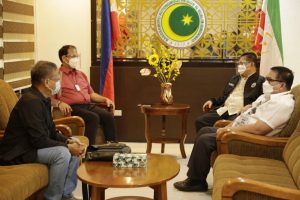
FILE PHOTO | Presidential Peace Adviser and NTF COVID-19 Chief Implementer Carlito G. Galvez, Jr. meets with BARMM Chief Minister and MILF Chair Ahod B. Ebrahim, Al Haj after the turnover of 10,000 COVID-19 test kits and 900 GeneXpert cartridges to the Regional Interagency Task Force on COVID-19 (RIATF COVID-19) of the BARMM on August 2019
OPAPRU closely coordinated with the BARMM-IATF and shared its logistical resources such as vehicles for the safe transport of locally stranded individuals (LSIs) and returning overseas Filipinos (ROFs) in the region.
The National Task Force Against COVID-19 (NTF COVID-19), in which Presidential Peace Adviser Carlito G. Galvez Jr serves as chief implementer and vaccine czar, continues to help ramp up the COVID-19 testing, isolation, treatment and vaccination capacity of the Bangsamoro Government.
Despite the difficulties brought about by the pandemic, the Bangsamoro parliament continues to pass priority legislation such as the Bangsamoro Administrative Code, which will be instrumental in fully realizing the provisions of the BOL, which aim to uplift the lives of the Bangsamoro people.
Capacity building based on moral governance
The ability of the BTA to effectively fulfill its mandate not only depends on the systems, mechanisms, and policies in place, but more importantly on the capacity of its leaders to practice good governance.
To achieve this, the OPAPRU, together with its partners in the academe and the international development community, facilitated capacity-building initiatives for the BTA’s executive and legislative bodies that will enable them to better dispense their functions .
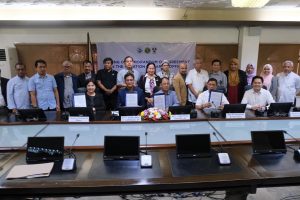
FILE PHOTO | MOA signing with the Development Academy of the Philippines (DAP) for capacity development of the BTA, July 2019
In line with OPAPRU’s efforts to oversee the implementation of the CAB and to help capacitate the BTA during the transition period, it partnered with the Development Academy of the Philippines (DAP) and the University of the Philippines (UP) College of Law in 2019.
The initiative provided technical training sessions for BTA officials on the basics of organizational development, as well key legal and taxation principles vis-à-vis the fiscal powers of the Bangsamoro Government as provided in Art. XII of the BOL.
Moreover, the BARMM leaders also underwent extensive training on public and financial management management, as well as on local government operations in partnership with well-known academic institutions.
The OPAPRU also co-chairs the Project Steering Committee of the Support to Bangsamoro Transition (SUBATRA) Project which aims to contribute to a peaceful, cohesive, secure and inclusively developed Bangsamoro. The SUBATRA is a five-year program funded by the European Union (EU) and the Agency for International Development Cooperation (AECID).
Normalization in the Bangsamoro
The OPAPRU, through various joint peace mechanisms established with the MILF who are now leading the BARMM Government, is also implementing the CAB’s Normalization Track, the “process whereby communities can achieve their desired quality of life, which includes the pursuit of sustainable livelihood and political participation within a peaceful deliberative society.”
The normalization track’s four components – security, confidence building measures, socioeconomic development, and transitional justice and reconciliation – aim to help former MILF combatants make the successful transition as peaceful and productive members of society.
Under the socioeconomic component, for instance, the OPAPRU and the BARMM’s Ministry of Basic, Higher, and Technical Education (MBHTE) partnered to implement the alternative learning system (ALS) and Technical-Vocational Education and Training (TVET) for decommissioned MILF combatants and their families.
And under the security component, the OPAPRU and the BARMM Ministry of Health worked closely with the Independent Decommissioning Body (IDB) to implement the third phase of decommissioning of MILF combatants and their weapons.
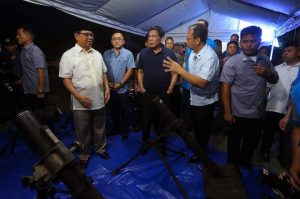
FILE PHOTO | President Rodrigo Roa Duterte leads the launching of the Second Phase of the Decommissioning of MILF combatants and weapons, September 7, 2019
According to Galvez, the Duterte administration remains steadfast in its commitment to help the BARMM Government realize its vision of unleashing the full economic potential of the region, as it improves the socio-economic well-being of its people.
“The Philippine Government will continue to support the Bangsamoro government especially during this extended transition period. President Duterte believes in the vast potential of the BARMM to become a showcase of genuine peace and sustainable development not only in Mindanao but throughout the country,” Galvez said.
“As you celebrate the BARMM’s third anniversary, we extend our heartfelt congratulations to the Bangsamoro Government for the outstanding and inspiring work you have done over the past three years. It has truly been an honor to be working side by side with such development-oriented and forward-looking leaders,” he added. ###


